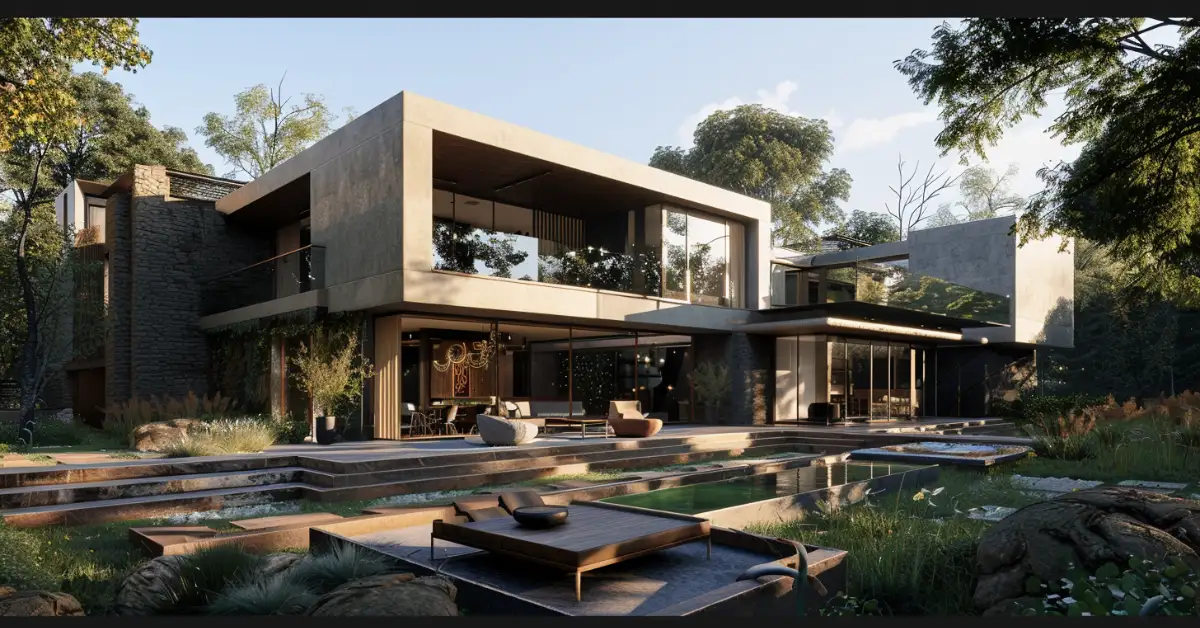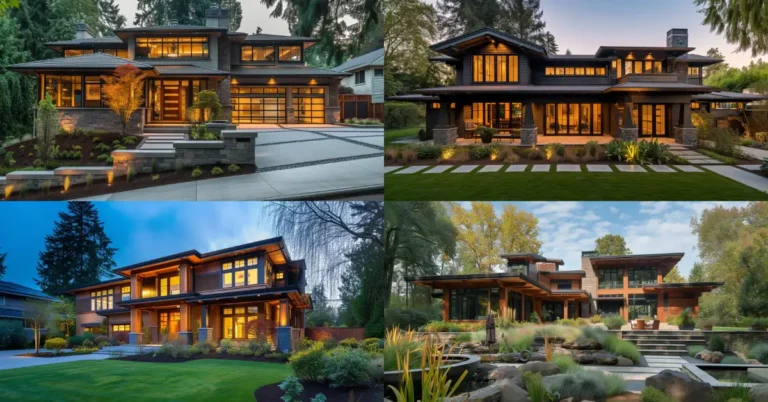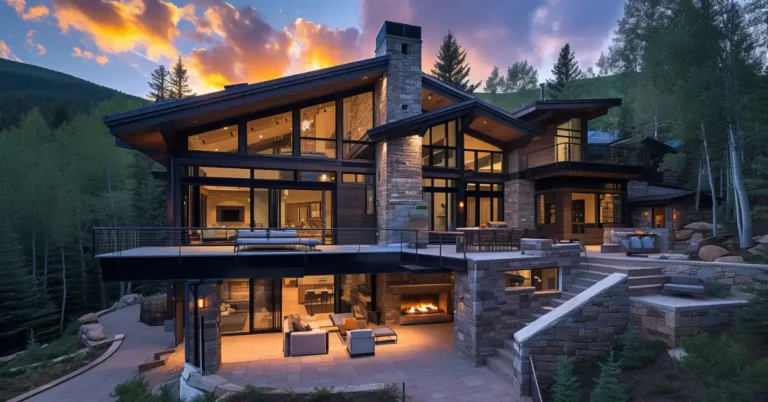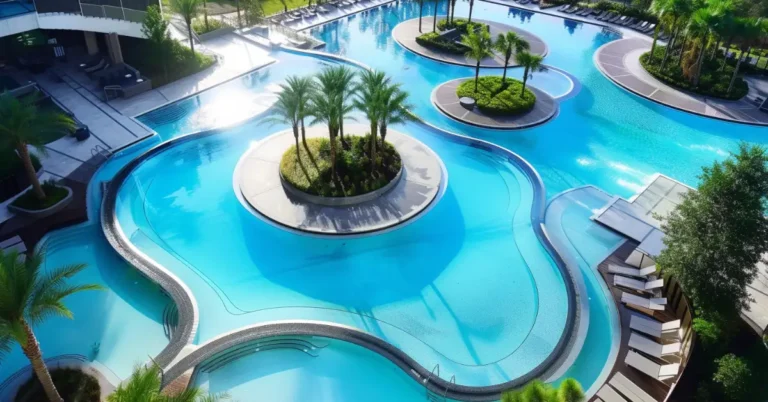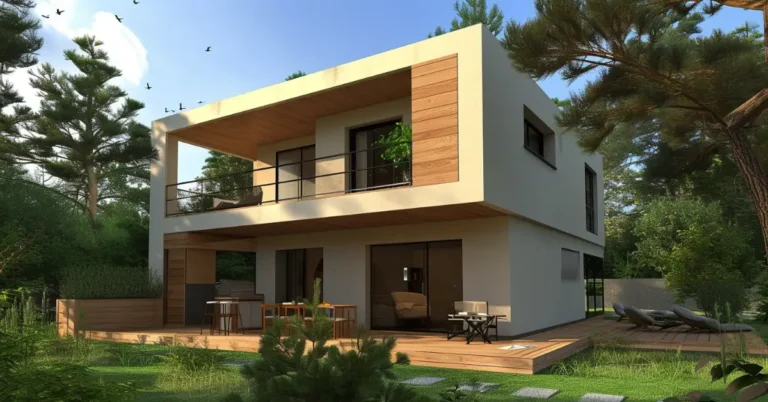Discover the allure of contemporary house exteriors and transform your home into a beacon of modernity. With their sleek blend of materials and innovative designs, these exteriors offer both style and functionality, ensuring your dwelling captures attention while harmonizing with its environment. Learn how to master the art of contemporary living with exteriors that make a statement and stand the test of time.
What Defines Contemporary House Exterior?
Here is all in short about Contemporary House Exterior!
| Feature | Description |
|---|---|
| Clean Lines | Bold geometric shapes and simple, crisp visuals devoid of ornate detailing. |
| Neutral Palette | A dominant use of neutral colors, such as whites, grays, and beiges. |
| Mixed Materials | An adventurous blend including wood, stone, and metal, often with textural contrasts. |
| Natural Light | Large windows and openings that allow ample sunlight to permeate the spaces. |
| Indoor-Outdoor Connection | Design that creates a seamless flow between internal and external spaces. |
| Minimalist Landscaping | Gardens and outdoor areas that echo the simplicity of the architectural design. |
By embracing these elements, our contemporary homes stand out as emblems of living art—practical, yet aesthetically pleasing, reflecting our current technological and cultural advancements.

Design Principles and Materials
When we explore the design of a Contemporary House exterior, it’s about the seamless blend of aesthetic appeal and functionality.
Contemporary Design Elements
Contemporary design elements are anchored in the idea of simplicity and elegance. We often find clean lines and geometric shapes forming the backbone of a modern home’s architecture. Glass plays a significant role as well, inviting natural light to flood interior spaces and forge a connection with the outdoors. In our designs, the integration of mixed cladding adds texture and serves to break the monotony, often combining materials like wood, stone, and metal.
Material Choices for Modern Exteriors
Choosing the right materials is not only crucial for energy efficiency and sustainability but also for maintaining the aesthetics and modern touch of the exterior. We see stucco, cement, and contemporary fiber cement siding as popular options that offer versatility and durability. Glass, apart from enhancing natural light, is a staple for modern homes, providing transparency and a sleek finish.
For warmth and character, we incorporate wood but treat it to withstand the elements, offering better insulation and weather resistance. Concrete and stone are two other materials that are not only robust but can also be manipulated artistically to create unique textures and lines on a Contemporary House exterior, ensuring longevity and innovation in design.
Additionally, these materials come with a variety of color options and are chosen for their cost-effectiveness and low maintenance requirements, making them ideal for a contemporary aesthetic that stands the test of time.

Color and Texture
Thinking of a “Contemporary House exterior,” we often visualize the interplay of colors and textures that characterize the modern look. The right choice can transform a simple structure into an architectural statement.
Choosing Exterior Paint Colors
For a contemporary home, selecting the right paint colors is crucial for achieving that sought-after modern look. It’s all about creating a compelling contrast against the natural landscape. We love white trim as it offers a sharp, clean line against deeper hues. Typically, for a minimalist and modern aesthetic, we recommend colors like Sherwin-Williams’ Sea Mariner to complement a cool-toned roof. On the other hand, Benjamin Moore’s Sussex Green provides a warm, earthy contrast that works beautifully with wood accents.
Consider the following combinations for a contemporary palette:
- Gray hues with white trim and black accents for a timeless look.
- Earthy greens paired with natural accents like wood and stone trim.
Incorporating Textures
Textures play an equally important role in the exterior of a contemporary house, providing both visual interest and a tactile quality that can greatly enhance the home’s appeal. We can’t get enough of brick and stucco finishes for their ability to add depth and character. Meanwhile, vinyl siding offers a cost-effective and versatile option with a range of textures that mimic more expensive materials.
To create texture diversity, consider these materials:
- Smooth, painted stucco for large, unbroken surfaces.
- Horizontal wood accents for warmth and organic appeal.
- Cut stone trim for a touch of craftsmanship and elegance.
In choosing textures for your contemporary house exterior, balance is key—we aim to strike a harmony between rugged natural textures and sleek, refined finishes to create a cohesive modern look.

Architectural Features
When we talk about the Contemporary House exterior, we’re looking at sleek, clean lines and unique design elements that set modern homes apart.
Front Entrances and Doors
The front entrance of a contemporary home is more than just a point of entry; it’s a statement piece. Modern bungalow and ranch-style homes often feature bold house numbers, glass panels, and a front porch that make the first impression. Farmhouses may sport larger, wraparound porches. Front doors in contemporary architecture tend to be oversized with unique designs, incorporating materials like frosted or clear glass for a touch of modern elegance and to allow natural light inside.
Windows and Rooflines
Windows in modern homes often act as design focal points, with architecture leveraging large expanses of glass to create a seamless connection between indoors and out. As for rooflines, contemporary houses shift away from traditional pitches; you might see flat or lean-to roofs alongside the more common pitched styles. These features not only contribute to the aesthetic but also define the architectural style, improving both form and function of the living space.

Landscape and Outdoor Spaces
When we talk about a contemporary house exterior, we’re not just discussing the house itself, but also how it harmonizes with its surroundings. Our focus here is to enhance curb appeal through thoughtful landscaping and create functional outdoor living areas that feel like an extension of our home’s interior.
Landscaping for Curb Appeal
The front yard sets the tone for any home, and with a contemporary house exterior, we aim for a design that complements its clean lines and modern aesthetic. Landscaping plays a pivotal role in this. We lean towards a minimalist approach, with carefully selected plants that add color and texture without being overwhelming. Sustainability also guides our choices, favoring native plants that thrive in local conditions with minimal upkeep. A well-designed pathway with pavers creates a welcoming entrance that’s both stylish and practical.
Utilizing Outdoor Living Areas
To make the most of our outdoor space, we consider it another room of the house. This means investing in elements like a patio or deck, which serve as the foundation for an inviting outdoor living space. Outdoor lighting is crucial, both for aesthetic and practical reasons, creating ambiance while ensuring safety. To further personalize our space, we incorporate outdoor decor and furniture that reflects our indoor style, seamlessly transitioning from inside to the open air. Whether it’s for entertaining or a private retreat, our outdoor living areas are designed to maximize comfort and function, giving us a whole new area to enjoy and entertain in.

Integration with Environment and Location
When we design a contemporary house exterior, we prioritize harmony with the surroundings and the latitude we’re building on.
Adapting to Climate and Sustainability
In adapting to climate, we focus on using sustainable materials and implementing features like advanced insulation techniques to enhance energy efficiency. This includes choosing materials that are both locally sourced and resilient against the local weather patterns. We often incorporate solar panels into our designs, as they are a clean energy source that can significantly reduce a home’s carbon footprint. Moreover, optimizing the use of natural light not only reduces energy consumption but also merges the indoor and outdoor spaces seamlessly.
- Materials: Locally sourced, sustainable, climate-resilient
- Features: Solar panels, advanced insulation
- Benefits: Enhanced energy efficiency, reduced carbon footprint
Considering Location and Views
Our orientation of a home is dictated by the best views and the existing landscape. For instance, if the location offers a panoramic mountain vista or an expansive seascape, our layout will feature large windows or glass walls to capitalize on these views. The current home layout is skillfully planned to create a visual and accessible connection to the outdoors. This forms a narrative where the home acts as a retreat that opens up to nature without compromising on privacy.
- Home Orientation: Maximizes the best views
- Layout: Enhances connection to the environment
- Outcome: Home as a retreat, balancing exposure with privacy

Our Personal Design Tips for Your Contemporary House Exterior
When we think about a contemporary house exterior, we’re looking at clean lines, a minimalist aesthetic, and a harmony between structure and nature.
Color Palette: Stick to neutrals for timeless elegance. Incorporating shades like white, grey, and beige can make your home look modern yet welcoming. For a dash of boldness, consider a dark accent on features like the front door or shutters.
Materials: Mix and match different textures. A combination of wood, metal, and glass not only adds visual interest but also reflects contemporary architectural standards. Our favorite is the use of unique materials that can make your home stand out while maintaining that modern vibe.
Landscaping: Keep it simple with geometric shapes and local plants. The goal is to create a cohesive flow from nature to your home. Smart landscaping can transform the overall look, just be sure to choose plants that complement your design.
| Feature | Suggestion |
|---|---|
| Front Door | Go bold with a trendy color or unique design. |
| Windows | Opt for large windows that let in natural light. |
| Lighting | Use sleek fixtures to illuminate and accentuate. |
| Accessorize | Include a statement piece, like a striking mailbox or house numbers. |
Remember, the key is cohesion — every detail contributes to the collective beauty of your modern home exterior. By focusing on purposeful design and personalized touches, we can create a space that feels both current and timeless.
FAQ – Contemporary House Exterior
What is contemporary style home exterior?<div jsname="Q8Kwad" class="aj35ze" style="background-image: url("data:image/svg+xml,<svg focusable=\"false\" xmlns=\"http://www.w3.org/2000/svg\" viewBox=\"0 0 24 24\"><path fill=\"%2370757a\" d=\"M16.59 8.59L12 13.17 7.41 8.59 6 10l6 6 6-6z\"></path>
A contemporary style home exterior typically features clean lines, minimal ornamentation, and a mix of modern materials such as glass, steel, and concrete. Large windows, asymmetrical designs, and a focus on sustainable elements like solar panels or green roofs are common characteristics.
How can I make my house exterior look contemporary?
To achieve a contemporary look for your house exterior, focus on clean lines, minimalism, and modern materials. Incorporate elements like large windows, asymmetrical designs, metal accents, and neutral color palettes. Consider adding sustainable features like solar panels or energy-efficient landscaping for a modern touch.
What is the exterior of a modern house made of?
The exterior of a modern house can be made of a variety of materials, including concrete, glass, steel, wood, stone, and sometimes combinations of these materials. The choice of materials often emphasizes clean lines, minimalism, and a connection to nature or the surrounding environment.
What is the difference between contemporary and modern house exterior?
The main difference between contemporary and modern house exteriors lies in their design principles and historical context. Contemporary design reflects current trends and styles, often featuring a mix of materials and sleek lines. Modern design refers to a specific architectural movement from the early to mid-20th century, characterized by simplicity, clean lines, and an emphasis on function.

